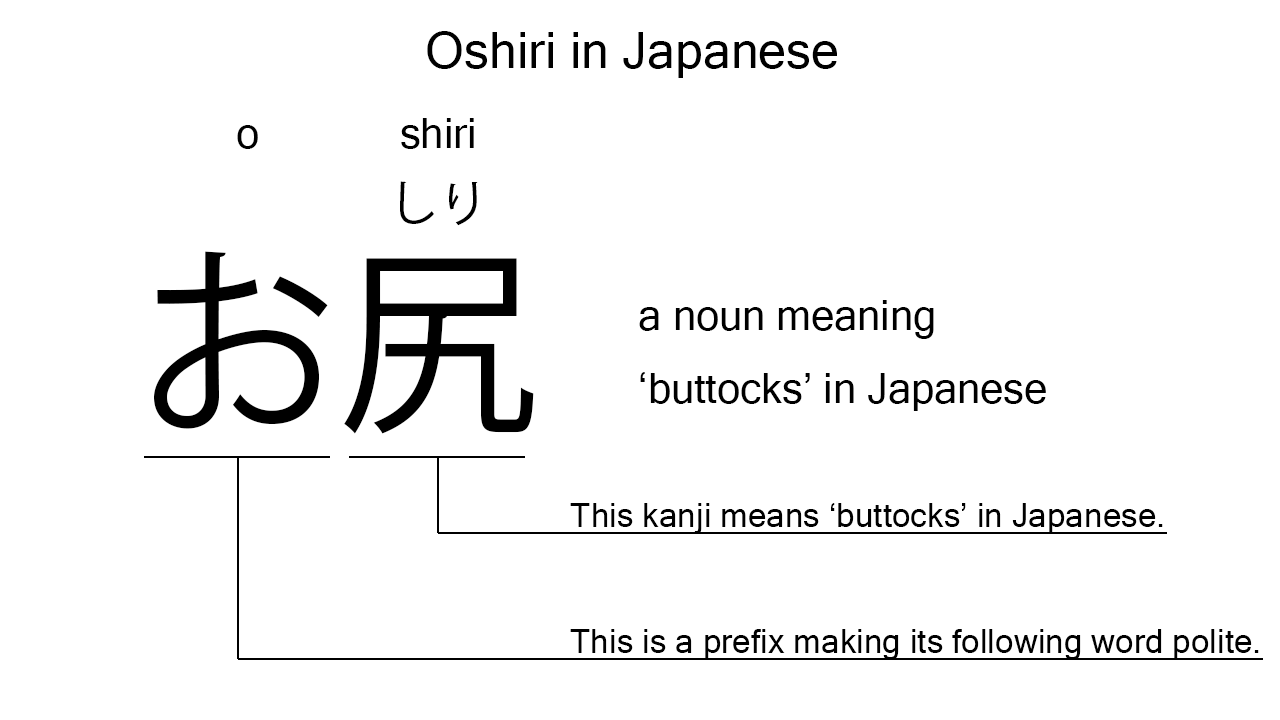What does “oshiri” mean in Japanese?
Native speakers say “oshiri” to mean ‘buttocks’ in Japanese. Perhaps, some Japanese learners know this word as it is sometimes used in Japanese movies, songs, novels, manga, anime, and the like. In this blog post, however, I will explain this word in detail based on its grammatical components. And also, I will explain how to use it through example sentences. My explanations would help Japanese learners understand “oshiri” more clearly. Then, let’s get started!
Contents
Definition and meanings of “oshiri”
Let me start with the definition and meanings of “oshiri”.
- oshiri – お尻 (おしり) : a noun meaning ‘buttocks’ or ‘butts’ in Japanese.
The definition and meanings are simple and clear, I think. To understand this noun more clearly, however, let me explain its grammatical components in detail, one by one.
What does “oshiri” literally mean in Japanese?
“Oshiri” consists of the following two components:
- o – お : a prefix making its following word polite.
- shiri – 尻 (しり) : a noun meaning ‘buttocks’ in Japanese.
These two components tell us that the formed word is literally the polite expression for ‘buttocks’ in Japanese. And actually, it is. Japanese native speakers normally refer to buttocks with showing their respect.

When we meet new Japanese words, we should check their grammatical components in detail to understand their meanings clearly and deeply. In many cases, components tell us a lot about the meanings of the words they form. Actually, here, we could get the better understanding of “oshiri” through the detailed check above.
So far, I’ve explained the definition and meanings of “oshiri” together with its grammatical components. Then, let me explain how to use it through the example sentences below.
Example #1: how to say “butts” in Japanese
watashi wa oshiri ga itai desu – 私はお尻が痛いです (わたしはおしりがいたいです)
My butts hurt.
Below are the new words used in the example sentence.
- watashi – 私 (わたし) : a pronoun meaning ‘I’ in Japanese.
- wa – は : a binding particle working as a case marker or topic marker. In the example, this works as a topic marker after “watashi” to put a focus on it.
- ga – が : a case particle used to make the subject word or the object word in a sentence. In the example, this is used after “oshiri” to make the subject word in a sentence.
- itai – 痛い (いたい) : an i-adjective meaning ‘painful’ or such in Japanese.
- desu – です : an auxiliary verb used after a noun or adjective to make it polite. Probably, this is well known as a part of Japanese desu form. In the example, this is used after “itai” to make it sound polite.
This is a typical usage of “oshiri”. In this example, it works together with the case particle, “ga”, to become the subject in the sentence.
Example #2: another usage of “oshiri”
nagaku suware ba, oshiri ga itaku naru – 長く座れば、お尻が痛くなる (ながくすわれば、おしりがいたくなる)
If you sit for a long time, your butts will hurt.
Below are the new words used in the example sentence.
- nagaku – 長く (ながく) : one conjugation of the i-adjective, “nagai“, which means ‘long’ in Japanese. In the example, it has been conjugated for the better connection with its following word.
- suware – 座れ (すわれ) : one conjugation of the verb, “suwaru“, which means ‘to sit’ or such in Japanese. In the example, it has been conjugated for the better connection with its following word.
- ba – ば : a conjunctive particle used after a verb, adjective, or auxiliary verb to make its conditional form. In the example, this is used after “suware” to make its conditional form, “suware ba”.
- itaku – 痛く (いたく) : one conjugation of the i-adjective, “itai”, which means ‘painful’ or such in Japanese. In the example, it has been conjugated for the better connection with its following word.
- naru – なる : a verb meaning ‘to become’, ‘to get’, ‘to turn’, or just ‘to be’ in Japanese. In the example, this works together with “itaku” to mean ‘will hurt’ in Japanese.
This is another typical usage of “oshiri”. When we want to mean ‘butts’ in Japanese, this noun is always a very good option.
Summary
In this blog post, I’ve explained the definition and meanings of “oshiri” in detail based on its grammatical components. And also, I’ve explained how to use it through the example sentences. Let me summarize them as follows.
- oshiri – お尻 (おしり) : a noun meaning ‘buttocks’ or ‘butts’ in Japanese. This is literally the polite expression for ‘buttocks’ in Japanese. Japanese native speakers use this noun to refer to buttocks with showing their respect.
Hope my explanations are understandable and helpful for Japanese learners.